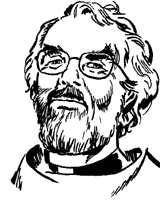
 ROWAN WILLIAMS
ROWAN WILLIAMSArchbishop of Wales
Rowan Williams, exiled to Monmouth in 1992 and enthroned as Archbishop of Wales in 2000, is the candidate of everyone disgruntled and disappointed by the Carey years.
Conversely, it is safe to say that he is the successor George Carey would least like to see. That is not the only quality that make him worth a small bet, though it has been a safe general rule since the war that the prime minister always chooses the archbishop whom his predecessor would least have wanted.
If Chartres represents organisational continuity with the Runcie years, Rowan Williams stands for the ideology of a Church self-confidently run by dons. As a poet, don and theologian himself, he is the natural intellectual's candidate. This is not to say that he can't use short and clear words when he wants to. This interest in language may arise because he was born into a Welsh-speaking family. Be that as it may, he managed to talk excellent and subtle sense on the subject of sex on television. He has the sense to keep out of the way of the press most of the time and the wit to handle them when he must.
But Williams can also address his fellow bishops as if they were an Oxford common room (he was dean of Christ Church for nearly 10 years) and he speaks about Wittgenstein to such an audience as if it never occurred to him that anyone might not accept such an authority. The effect was comic when he did this at the Lambeth Conference in 1998; if his audience had known that Wittgenstein was not only a philosopher, but gay as well, they'd probably have booed out loud. That doesn't mean the effort wasn't worth making.
Like Chartres, he has sought refreshment away from the drought and bitterness of the modern world in Orthodoxy. Though he is in favour of women bishops, and would, I think, be very much more tolerant and encouraging of gay priests than any of the other candidates, he is not really a modernist. He wants a Christianity that goes back to its roots, as simple as it needs to be, and no simpler.
He has the added advantage that he looks the part, with bardic, flashing eyes and eyebrows in which ravens might nest. His drawbacks are threefold: first foreign-ness. No archbishop from outside the country has ever been transferred to Canterbury; and Williams is quite clear that Wales is not a part of England. Secondly, lack of interest: he probably has little appetite for the job. Thirdly, he has no experience of large-scale administration.
It's hard to see an English committee choosing him unless prodded by a prime minister who was determined to see a break with the Carey years. But stranger things have happened.
Top of Page | Next Archbishop | Archive | SOF Home
Illustration: John Richardson / Funny Business
© Ship of Fools 2000